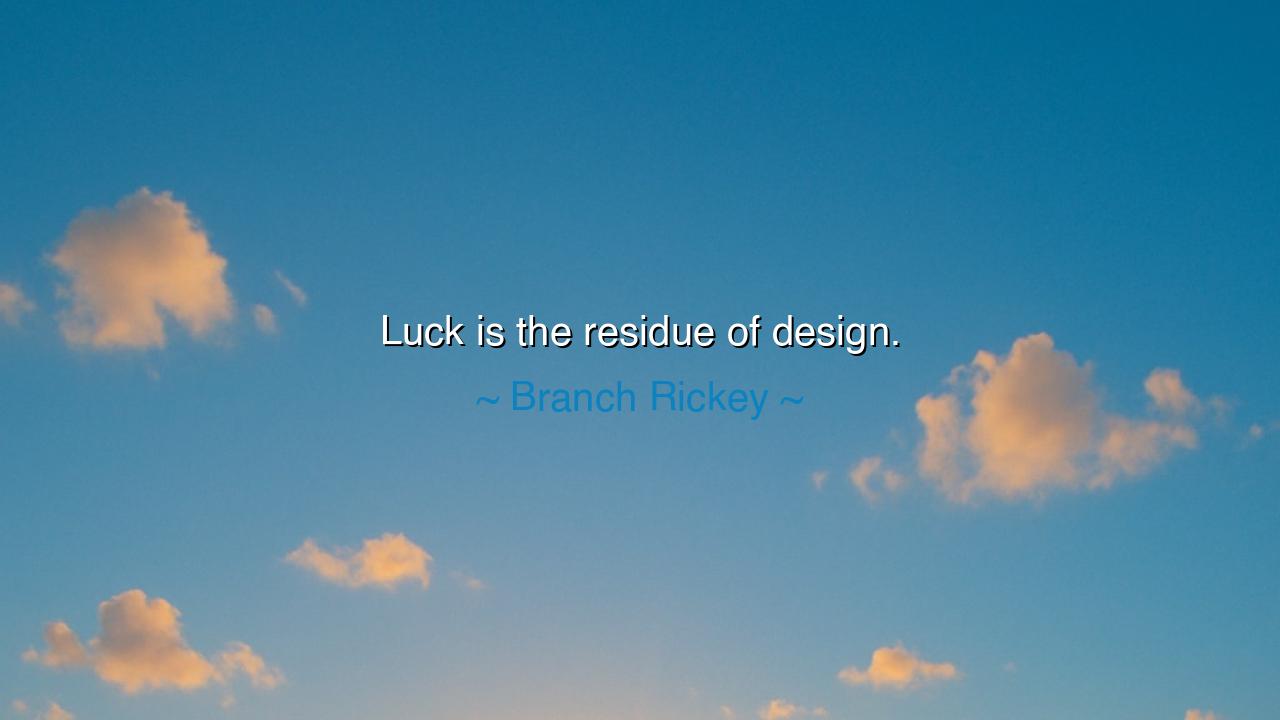
Luck is the residue of design.






The wise and visionary baseball executive Branch Rickey, the man who forever changed the face of American sports, once declared: “Luck is the residue of design.” These few words, forged in the fires of competition and experience, contain a truth as old as human endeavor: that what we call luck is not born of chance, but of preparation, discipline, and purpose. To the unthinking, success seems like fortune’s whim; to the wise, it is the fruit of foresight — the outcome of countless small choices, each made with care. Rickey did not believe in luck as magic; he believed in the design of destiny, wrought by steady hands and deliberate minds.
To understand these words, we must recall the man who spoke them. Branch Rickey was more than a manager; he was an architect of greatness. As the president of the Brooklyn Dodgers, he became a symbol of courage and vision when he signed Jackie Robinson in 1947, breaking Major League Baseball’s color barrier. Many called it luck that Robinson succeeded under impossible pressure, that he became both hero and legend. But Rickey knew it was no accident. He had chosen Robinson not merely for skill, but for strength of character — for the discipline to withstand hatred without hatred, and for the integrity to answer cruelty with dignity. What others saw as “luck,” Rickey saw as the residue of design — the inevitable result of foresight, planning, and moral conviction.
This truth, though spoken in the world of sport, reaches far beyond it. In every field — in art, in science, in war, in love — men have attributed success to fortune, when in truth it was born from intention. The inventor Thomas Edison once said that genius is “one percent inspiration and ninety-nine percent perspiration.” The general Alexander the Great trained his army not for glory but for precision, and his “luck” in battle was the natural reward of relentless preparation. Even the artist who paints with divine ease has first suffered through years of unseen practice. Luck comes not to those who wait, but to those who have built the vessel that can carry it when it arrives.
In this sense, Rickey’s quote reflects the ancient law of harmony between design and destiny. The universe does not reward the idle, nor does it bless the unprepared. It favors those who align their purpose with action, who move with awareness through each moment. To design one’s life is to cultivate the soil of fortune. When the rains of opportunity fall, only the field that has been tilled will bear fruit. The wise do not pray for luck; they prepare for it.
Yet there is humility in these words as well. For design cannot control everything — fate still moves in mysterious patterns. What Rickey teaches is not arrogance, but reverence for effort. He understood that while man cannot command the winds, he can set his sails. When the gusts of chance arise, the one who has designed his craft will move forward, while the unready drift aimlessly. This is not defiance of luck, but cooperation with it — the art of making destiny an ally rather than a stranger.
Think of Jackie Robinson again, stepping onto the field that first day. The jeers, the threats, the weight of history pressing upon him — all of it could have crushed a lesser man. But his success, which the world called miraculous, was the residue of years of design: of training, of character, of resolve. Behind his calm stood Rickey’s plan, and behind that plan stood a principle as old as the Stoics — that virtue and preparation make one immune to misfortune. Robinson was not lucky to survive the storm; he was ready for it.
So, my listener of the future, take this truth into your heart: luck is no mystery to the prepared mind. The miracles of others are often the quiet victories of persistence. Do not wait for fortune to favor you; design your days with intention, for in the structure of effort lies the seed of grace. When chance appears, meet it not as a beggar but as a builder who recognizes his own handiwork in the moment of reward.
For as Branch Rickey taught through word and deed, luck is the residue of design — the echo of diligence, the shadow of purpose, the reward of those who refuse to leave their destiny to chance. Design your life with wisdom, patience, and courage, and fortune will seem to follow you — not because you were lucky, but because you were ready.






AAdministratorAdministrator
Welcome, honored guests. Please leave a comment, we will respond soon